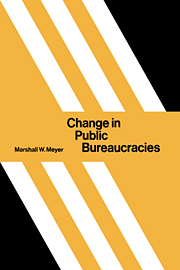1 - Issues in organizational theory
Published online by Cambridge University Press: 05 November 2011
Summary
A large body of literature on organizations exists, much of it falling under the rubric of theory. Organizational theory has a mixed character. It contains elements of prescription, prediction, and historical analysis. All of organizational theory need not be explored here, but some of the issues germane to public bureaucracies must be given consideration. One question, first raised by Max Weber, concerns the efficacy of bureaus as authority systems. Another issue, more current, is whether organizations ought to be treated primarily as open or closed systems, and, if the former, what the relevant dimensions of the environment are. A third issue, one that has not been given a great deal of systematic attention before, is whether theoretical statements can be made about organizations generally. This is not a question of technique (e.g., qualitative versus quantitative) but one of methodology in the broadest sense of the term: Does one aim for predictive statements, or does one settle for description aided and informed by the tools of the social sciences? All of these issues meld together nicely toward the latter part of this book, but they should be treated separately to begin with.
The efficacy of bureaus as authority systems
Max Weber's (1946) classic essay on bureaucracy signals its development as a distinctly modern form of administration, but the essay also contains important hypotheses about the behavior of bureaus. Let us put aside the debate as to whether or not the ideal–typical model of bureaucracy elaborated by Weber can be tested at all. Weber said not in his Methodology in the Social Sciences (1949), but most investigators have ignored his stricture and I shall also.
- Type
- Chapter
- Information
- Change in Public Bureaucracies , pp. 16 - 41Publisher: Cambridge University PressPrint publication year: 1979



